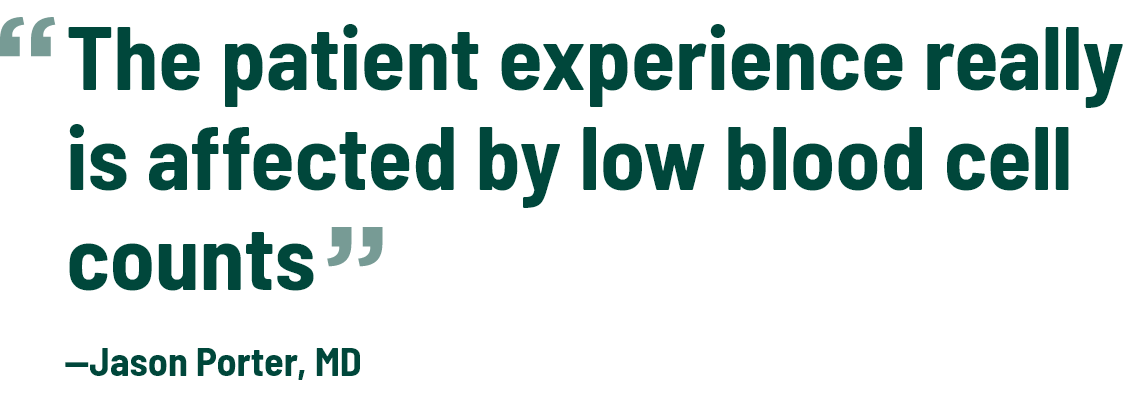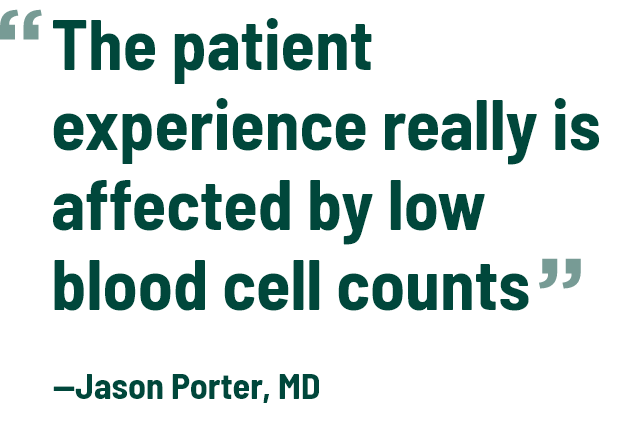- Patient-reported outcomes (PRO) data were descriptive and exploratory study endpoints in the three clinical studies to measure COSELA's effects on health-related quality of life (HRQoL). For each study, PRO completion rates were >80% in both the COSELA and placebo groups. Outcome measures were not validated in the study population; therefore, no conclusions can be drawn
- Caution should be taken when interpreting data pooled analysis, because differences in the patient population and chemotherapy backbones exist across the three individual studies


To decrease the incidence of chemotherapy-induced myelosuppression in patients when administered prior to a platinum/etoposide-containing regimen or topotecan-containing regimen
For extensive-stage small cell lung cancer (ES-SCLC)
PATIENT-REPORTED OUTCOME MEASURES WITH COSELA IN A RETROSPECTIVE POOLED ANALYSIS
POOLED ANALYSIS OF EXPLORATORY ENDPOINTS ACROSS THREE STUDIES: COSELA® (trilaciclib) Proactively Given Prior to Etoposide/Carboplatin/Atezolizumab (E/P/A) or E/P in 1st-Line ES-SCLC Treatment and Prior to Topotecan in 2nd- or 3rd-Line
median time to confirmed deterioration (ttcd) in patient-reported outcomes1
Pooled data from all three studies were evaluated to provide more precise estimates of trilaciclib treatment effects for low frequency RBC-related events and to assess consistency of treatment effect by trilaciclib across relevant subgroups.
Chemotherapy Regimen Arm = Placebo + E/P/A or E/P or Topotecan.
NYR=not yet reached
- Subscales and measures of the FACT-Anemia (Functional Assessment of Cancer Therapy-Anemia or FACT- An) questionnaire, considered most relevant to measure the impact of chemotherapy on patient HRQoL, were selected a priori for the pooled analysis. At baseline, across all of the studies, mean scores for these domains were similar between the COSELA groups, with the placebo groups having slightly higher values
- Time to confirmed deterioration (TTCD), or worsening, was defined as a decrease from baseline by a clinically meaningful threshold for 2 consecutive visits: ≤3 points for physical wellbeing, functional wellbeing, and fatigue; ≤6 points for anemia trial outcome index points: ≤7 points for FACT-Anemia (Functional Assessment of Cancer Therapy-Anemia or FACT-An) scores. Meaningful change thresholds were derived from published literature
- TTCD analyses may be influenced by definition of worsening, intercurrent events (ie, toxicity, death, etc), and PRO assessment frequency2
HEAR FROM A PEER
JASON PORTER, MD, SHARES THE IMPACT CHEMOTHERAPY-INDUCED MYELOSUPPRESSION CAN HAVE ON THE DAILY LIFE OF PATIENTS
Watch Video >

REVIEW
CLINICAL EFFICACY
SAFETY
RESOURCES FOR Healthcare Professionals